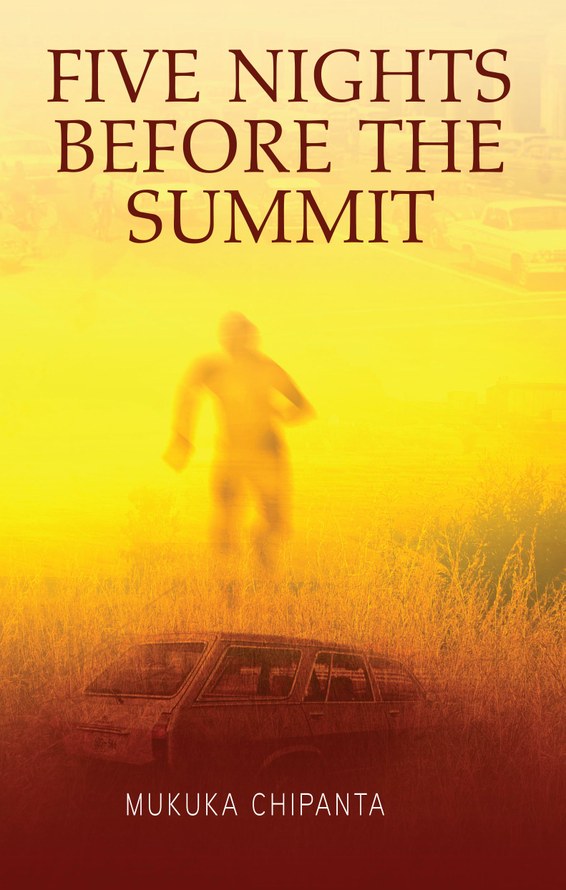Suspense in Southern Africa: Mukuka Chipanta’s Five Nights Before the Summit | A Review by Gilbert Braspenning
Although typified in some blurbs as crime fiction, Mukuka Chipanta’s second novel is so much more than that: it is also a well-crafted historical novel.
Detective Maxwell Chanda, head of the Special Crimes Investigation Unit, is tasked with the investigation of the brutal murders of Laura and Henry Hinckley, a white British couple living on a farm just outside Lusaka.
Maxwell, or Max, is under great pressure from his superiors to solve the case within five days, as at that moment the Commonwealth Heads of Government Summit is due to take place in Zambia. This summit is headed by Queen Elizabeth herself and British Intelligence is putting high pressure on the Zambian authorities to clear up the case before the queen arrives. The British authorities even threaten to cancel the queen’s visit if the murder case is not solved within five days. And this would not only be a shame for Zambia and president Kaunda, but would also thoroughly harm the relations between Great Britain and Zambia.
But, as it turns out, the reason for British Intelligence to urge for a quick roundup of the culprits is twofold: on the one hand they don’t want the murder case to loom around – in the press- during the impending Queen’s visit; but on the other hand they don’t want the real truth around the Hinckley murders to come out; as soon as detective Chanda discovers that there’s a white hand involved in the murders, he is forced – via his superior Chief Mbewe, but indirectly by M16 – to close the case. For British Intelligence, however, the case is closed as soon as some black culprits have been arrested.
Nevertheless, for the reader – and detective Chanda alike – the case is not closed at all; at the end of the novel you are left with a huge feeling of injustice; injustice because, as with many cold cases where politics is involved, it is only the petty criminals that are convicted whereas the real perpetrators get off scot-free. Mukuka Chipanta leaves the reader regretting that the story has ended, but in the meantime with hope that justice will be done in his next book. As reader, you hope for a quick sequel to Five Nights Before the Summit. The suspense is actually suspended until Chipanta’s next novel.
Just as in a good crime novel, the suspense builds up very well. Apart from the rich narrative, this suspense is for a major part the result of the rather short consecutive chapters, each one embodying a perspective shift at the right moment. Also flash back is a proven means to, temporarily, ease the suspense at the right moment. In Chipanta’s new novel this technique is often used to describe the personal history of his characters. There are, for example, extensive flash backs on the cot death of Maxwell Chanda’s daughter, Lindiwe, and its consequences for Max’s relationship with his wife Mavis, on Laura and Henry Hinckley’s life, and on the years Paul Mutamina and Amos Mushili – two of the criminals that attacked the Hinckley Farm – spent together in prison.
Apart from the fact that these flash backs ensure a necessary ease of suspense, they provide an intense character portrayal of the protagonists. This intensity makes the novel, and its characters, roam around in your head, long after you’ve finished reading it.
Apart from being a mind-gripping and fast-paced crime novel, Five Nights Before the Summit is a thorough portrayal of an independent postcolonial nation in which the former colonizer still has a determining grip on politics, society and economy. It is the story of a proud independent Zambia, but machinated and infiltrated by the British in all sectors of economy, particularly in the mining industry.
Whereas the infiltration of the Chinese in the copper mine business provides a central theme in A Casualty of Power – Chipanta’s first novel – it is the interference of the British (and British Intelligence) with the gemstone business that plays a major role in his second novel; As with A Casualty of Power, Five Nights Before the Summit could be read as an ultimate cry for justice in Zambia.
Another similarity among the two novels is that the borderline between reality and fiction is blurred: the storyline in both novels follows historical developments in Zambia, shows events that really took place, and portrays historical figures. Regarding Five Nights Before the Summit for example, the Commonwealth Heads of Government Summit really took place in Lusaka in 1979, graced by Queen Elizabeth and chaired by Kenneth Kaunda, and some characters, like Rab Butler, a British politician and Henry Hinckley’s uncle, really did exist.
As the reader, you wonder all the time what’s real, and what’s fiction. And this in turn provides another kind of suspense: it triggers your curiosity about the past and present political and social situation in Zambia; did some farm murders really take place just before the 1979 summit? Was the political and judiciary Zambian system indeed so corrupt as described in Chipanta’s novel? And how did the situation develop afterwards in Zambia and in postcolonial Africa? Is the system, in one way or another, still infiltrated by British Intelligence? After finishing Five Nights Before the Summit I caught myself – like a true detective – looking for clues on the internet. For example, the end of the plot seems to be suspended to a next novel, real insight in the actual political situation is likewise suspended. Reading Five Nights Before the Summit is like having a good aperitif; it satisfies your hunger temporarily but leaves you longing for the main dish even more. If this is what a good historical novel has to induce, than Mukuka Chipanta has written one.
In a broader sense, as in many great African novels from the seventies and eighties, this work addresses the shortcomings of a young nation state: decay, a poor population, corruption, and a weak police and judicial system.
Apart from being a deftly crafted detective story Mukuka Chipanta’s second book is an historical novel at its best. There is no better typification of the novel than that of the publisher on the back cover: ‘Five Nights Before the Summit offers a rich tapestry of context and character in a story that engages the reader in the pursuit of justice.’.
Chipanta, Mukuka (2019), Five Nights Before the Summit. Harare: Weaver Press, 206p., ISBN 9781779223616
Gilbert Braspenning (Editor Africa Book Link)
This book review was published in: Africa Book link, Spring 2020



